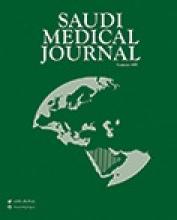Brief ReportBrief Communication
Open Access
Team-based learning student assessment instrument (TBL-SAI) for assessing students’ acceptance of TBL in a Saudi medical school
Psychometric analysis and differences by academic year
Mutasim E. Ibrahim
Saudi Medical Journal May 2020, 41 (5) 542-547; DOI: https://doi.org/10.15537/smj.2020.5.25054
Mutasim E. Ibrahim
From the Departments of Basic Medical Sciences and Medical Education, College of Medicine, University of Bisha, Bisha, Kingdom of Saudi Arabia
PhD, MHPE
References
- ↵
- ↵
- Nation LM,
- Tweddell S,
- Rutter P
- ↵
- Livingston B,
- Lundy M,
- Harrington S
- ↵
- ↵
- Faezi ST,
- Moradi K,
- Ghafar Rahimi Amin A,
- Akhlaghi M,
- Keshmiri F
- ↵
- Keshmiri F,
- Rahmati A,
- Amin AG,
- Faezi T
- ↵
- Sharaf F,
- Alnohair S
- ↵
- Ibrahim ME,
- Al-shahrani AM
- ↵
- Ibrahim ME,
- Al-Shahrani AM,
- Abdalla ME,
- Abubaker IM,
- Mohamed ME
- ↵
- Corbridge SJ,
- Corbridge T,
- Tiffen J,
- Carlucci M
- ↵
- Roh YS,
- Lee SJ,
- Mennenga H
- ↵
- Remington TL,
- Bleske BE,
- Bartholomew T,
- Dorsch MP,
- Guthrie SK,
- Klein KC,
- et al.
- ↵
- Gryka R,
- Kiersma ME,
- Frame TR,
- Cailor SM,
- Chen AMH
- ↵
- Eksteen MJ,
- Reitsma GM,
- Swart SB,
- Fourie E
- ↵
- Frame TR,
- Cailor SM,
- Gryka RJ,
- Chen AM,
- Kiersma ME,
- Sheppard L
In this issue
Team-based learning student assessment instrument (TBL-SAI) for assessing students’ acceptance of TBL in a Saudi medical school
Mutasim E. Ibrahim
Saudi Medical Journal May 2020, 41 (5) 542-547; DOI: 10.15537/smj.2020.5.25054
Jump to section
Related Articles
- No related articles found.
Cited By...
- No citing articles found.





